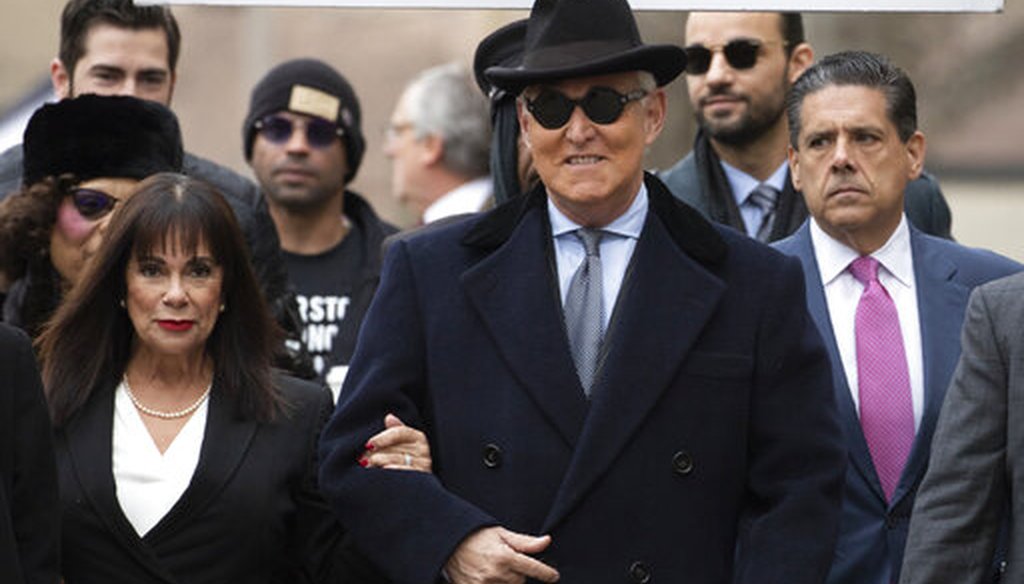Stand up for the facts!
Our only agenda is to publish the truth so you can be an informed participant in democracy.
We need your help.
I would like to contribute

Roger Stone and his wife Nydia Stone arrive for sentencing at U.S. District Court in Washington, D.C., on Feb. 20, 2020. (AP)
If Your Time is short
• Trump’s commutation of the 40-month sentence for Roger Stone spares prison time for his political ally.
• There aren’t examples of past presidential clemency that line up precisely with Trump’s commutation of Stone, though there are echoes in the actions of presidents from both parties.
In Washington, there’s a history of announcing controversial actions on a Friday night, when the weekly news cycle is over and fewer Americans are watching. The announcement made by the White House on July 10 was a big one: President Donald Trump commuted the sentence of longtime confidant Roger Stone on charges stemming from Robert Mueller’s special counsel investigation.
At the time of the commutation, Stone was just days away from starting a 40-month sentence in federal prison. He had been convicted on several counts that involved lying to Congress about the 2016 election. Specifically, he wasn’t truthful about his efforts to get information from WikiLeaks on Democratic emails stolen by Russian agents. He also was convicted of pressuring comedian Randy Credico to support his story.
Stone is a longtime Republican operative known for his unconventional, colorful, and sometimes envelope-pushing tactics. Critics pounced on Trump’s commutation for Stone, saying it was at least unseemly, and possibly unprecedented.
Here, we’ll take a closer look at the circumstances and the historical context.
Who is Roger Stone?
Stone got his start in national politics working for Richard Nixon; he supported his campaign by executing "dirty tricks," a term Stone often embraced. (Stone famously has Nixon’s face tattooed on his back.)
In 1980, Stone became a co-founder of the lobbying firm that eventually became Black, Manafort, Stone & Kelly. The "Manafort" was Paul Manafort, who was Trump’s onetime presidential campaign chairman but who is now in prison for activities related to his lobbying work.
The firm became a powerhouse in Washington lobbying, sometimes taking heat for its controversial overseas clients, including Angolan guerilla leader Jonas Savimbi, Zairean dictator Mobutu Sese Seko, and allies of Ferdinand Marcos, then the dictator of the Philippines.
Stone brought in Trump as a client for the firm. While Stone never had a title with the 2016 Trump campaign, he had long been a sounding board.
In recent years, Stone became less of an establishment figure, and he wrote a book arguing that future President Lyndon B. Johnson was behind the assassination of President John F. Kennedy, which historians have said has no credibility. "I would place him more recently on the fringe," said Paul Kengor, a Grove City College political scientist and biographer of Ronald Reagan.
But Stone seemed to revel in whatever ostracism he encountered, eagerly posting others’ insults on his website.
"It’s always better to be talked about than not talked about," Stone once told the Miami Herald. "And the biggest sin in politics is to be boring."
Stone’s commutation in historical context
Democrats said the commutation amounted to an abuse of the rule of law. Democratic Reps. Jerrold Nadler and Carolyn B. Maloney, two House committee chairs, said they would investigate the matter.
Several academic experts in presidential clemency told us they considered it problematic.
"The president commuted the prison sentence of one of his longtime friends and political advisers who was convicted of essentially lying to protect Trump," said Jeffrey Crouch, an assistant professor of American politics at American University. The framers of the Constitution "intended clemency to be used to show mercy to an individual or to serve the larger national interest. The Stone commutation does neither. It only serves the interest of the president and his allies."
Brian C. Kalt, a law professor at Michigan State University, said his biggest worry about the Stone commutation is that "it sends a signal to others that Trump will take care of them if they protect him from investigators."
Meanwhile, there is a benefit to Trump in commuting the sentence rather than issuing a pardon. A pardon forgives a conviction, while a commutation preempts or ends a sentence without forgiving the conviction.
"Stone retains his privilege against self-incrimination and cannot be forced to talk, as he could be after a pardon," said Harold H. Bruff, an emeritus University of Colorado law professor.
Is Trump’s commutation of Stone’s sentence unprecedented?
Experts said that there aren’t examples that line up precisely with Trump’s commutation of Stone, but there are echoes.
Jonathan Turley, a George Washington University law professor who testified against Trump’s impeachment earlier this year, offered a long list of presidents who made questionable pardons or commutations in an op-ed. Most of the actions on his list involved presidential allies or dubious characters.
Neither Nixon nor Reagan offered clemency to figures in the primary scandals of their tenures, Watergate and Iran-Contra, respectively.
The closest analogue might be George H.W. Bush, experts say. Bush, who was vice president during the Iran-Contra affair, pardoned six officials involved in Iran-Contra. One of them, former Defense Secretary Caspar Weinberger, who could have been retried and could then have called Bush to testify in his case.
"There was a self-serving component to these pardons that is reminiscent of Trump’s commutation of Stone," said Daniel Kobil, a law professor at Capital University.
Another, Kalt said, was Bill Clinton’s pardon of Susan McDougal, who had gone to jail for contempt for refusing to testify against Clinton in the Whitewater scandal. (Officially, the pardon was for other charges). Clinton also gave pardons and commutations to officials convicted in an independent counsel’s probe of influence peddling at the Agriculture Department.
"There are analogies, but not precedents," Kalt said.
What, if anything, can be done by congressional critics of Stone’s commutation?
There are few limits on presidential clemency powers, as we’ve reported. Article II, Section 2, of the Constitution says the president "shall have the Power to grant Reprieves and Pardons for offenses against the United States, except in Cases of Impeachment."
The power of the pardon "is considered one of the least limited powers of the executive," said James Robenalt, a lawyer at the firm Thompson Hine and an expert on Watergate.
This authority can be traced back to the power of English kings to pardon. In Federalist Paper No. 74, Alexander Hamilton wrote, "Humanity and good policy conspire to dictate, that the benign prerogative of pardoning should be as little as possible fettered or embarrassed."
However, the framers’ solution to questionable uses of clemency are at odds with our current political culture, Kalt said.
The framers envisioned that that the House would investigate and, if the clemency was found to be inappropriate, House members would impeach the president and the Senate would vote for removal. But with today’s high degree of partisan polarization in Congress, "it’s pretty obvious that nothing like that is going to happen," Kalt said.
Our Sources
New York Times, "Trump Commutes Sentence of Roger Stone in Case He Long Denounced," July 10, 2020
Miami Herald, "In the bizarro world of Roger Stone, being bad is good. At least until Friday’s arrest," Jan. 25, 2019
Washington Post, "The Swamp Builders: How Stone and Manafort helped create the mess Trump promised to clean up," Nov. 29, 2018
CNBC, "GOP operative Roger Stone begs Trump for pardon or sentence commutation as prison surrender looms," July 7, 2020
CNBC, "Paul Manafort could spend the rest of his life in prison. Here are the charges the former Trump campaign boss faces as the case goes to the jury," Aug. 15, 2018
Time magazine, "How Roger Stone Connects Donald Trump to Richard Nixon," Jan. 25, 2019
Daily Beast, "Top Trump Aide Led the ‘Torturers’ Lobby,’" Nov. 06, 2017
Jonathan Turley, "Why this Roger Stone commutation is not as controversial as some think," July 11, 2020
PolitiFact, "Can the president pardon himself? 4 questions about the presidential pardon," July 21, 2017
Email interview with Paul Kengor, Grove City College political scientist and biographer of Ronald Reagan, July 13, 2020
Email interview with Craig Shirley, biographer of Ronald Reagan, July 13, 2020
Email interview with Brian C. Kalt, law professor at Michigan State University, July 13, 2020
Email interview with Harold H. Bruff, emeritus University of Colorado law professor, July 13, 2020
Email interview with Jeffrey Crouch, assistant professor of American politics at American University, July 13, 2020
Email interview with Daniel Kobil, law professor at Capital University, July 13, 2020








































